Thursday 12th April 2012 Phnom Penh.
Up and packed at dawn, down to Brekky and wait for 7.00am pickup to take us to the dock for our river boat trip from Phnom Penh (Cam) to Chau Doc (Viet). 7.00am comes and goes, by 7.30am Allan thought we should do something about it and rang the organising company. They said they hadn’t forgotten us they we just running late due to many bookings. After 10 minutes a mini van arrives, we scramble in with our packs and sit waiting to depart. One minute later a little bloke in a Tuk Tuk turns up and tells us we are to go to him. Confusion reigned. After several phone calls by him and the other tour operator, we get out of the bus and get into the Tuk Tuk. It turned out, the other tour operator tried to pinch us for their tour. We picked up two more guys along the way and four of us along with our luggage made our way to the docks in a Tuk Tuk that is built for no more than 2 1/2 people. Eventually boarded our river boat with about 15 others for our trip to the Cambodian Border. We set off and we were motoring along well however the boat captain kept looking behind us as if we were being chased by some nefarious scoundrel. An hour or so down the TonLe River the boat captain is still looking behind us, nothing there but clear water. About a half hour later we came to what can only be described as the most derelict, run down, safety hazard you will ever see for for a jetty to access a border crossing.
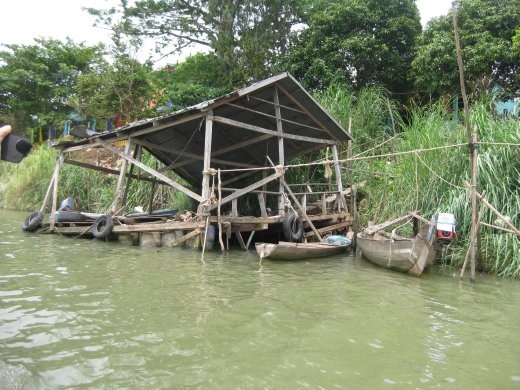
The boat pulled into the right bank as we went south toward Vietnam, at the Cambodian Immigration/Border Patrol and Passport check point. The jetty (or what was left of it) was a direct reflection on the wealth of Cambodia or so we thought. It so happens the jetty is maintained by the tour companies that use it to get their customers to the check point and of course no one, including the Cambodian Government will spend money on it. The jetty consisted of bamboo and timber planks criss-crossed with a few others and held together with granny knots of twine. Then there was the wooden bridge that took you off the jetty and up the stairs of the bank to get you to dry land for the short walk to the official check point. That consisted of a rickety handrail with wooden planks to keep you from falling in the TonLe River. The guide we had kept apologising for and watching for our safety, we did wonder how many people have actually fallen into the river.
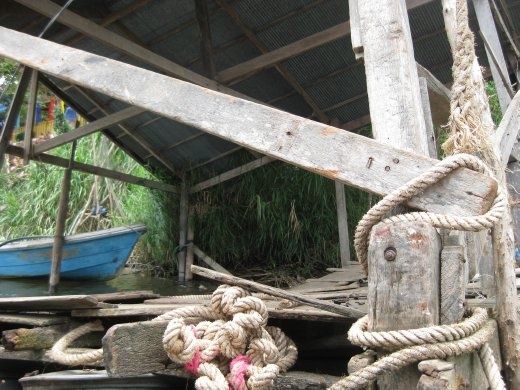
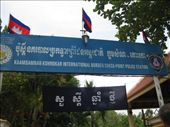
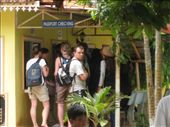
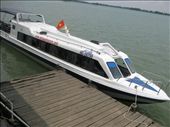
The passage through immigration was painless and the toilets were clean. We then scrambled back onto the boat for a short trip (5min) to the Vietnam Border. The Vietnamese check point is much more up market. It was built by the Vietnamese Government.
The guide took all our passports, and a $1 each and disappeared into the immigration station. He emerged 30 minutes later with them and we got on our way. The boat captain still looking behind for the nefarious scoundrels. Onward to Chau Doc Vietnam. It became apparent about 5 minutes down the river why the captain was looking behind.
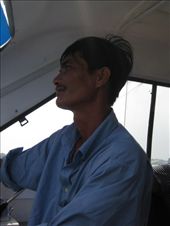
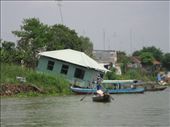
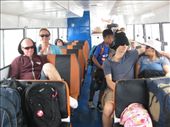
The black smoke that started emerging from the motor signalled the motor was in trouble. We limped down the TonLe River and into the Mekong River for about the next hour until the motor finally gave up the ghost. About 200 metres from the Chau Doc wharf, we stopped and prayed. The boat Captain got the motor to start again for 30 seconds and it died again. Eventually a rescue boat came and towed us into safety. Swimming and paddling were not an option. Where we docked in Chau Doc was also our accommodation for the night. It was called the Delta Floating Hotel. We had a neat little room with good clean facilities, running water was temperamental but nothing too bad. We then went for a sweaty walk around the immediate surrounds of Chau Doc where the main industry was wooden furniture. That evening we brought some bread rolls, some salad items and half a duck from a street vendor and made our own meal. Duck was tasty but tough. A point of interest for both Cambodia and Vietnam, motor cycle repair shops are everywhere.
Friday 13th April; Chau Doc.
Up again at 5.30am for a 6.15am breakfast before we were onto a river boat again. This tour took us to a multitude of fish farms, all of which were under the houses of the people who live on the water that form the Raft Villages.
They grow 1000s kg of fish each year that normally go to the local markets.
They feed them 8-10 times a day (see photo). Apparently it costs about $100k to set up but they recoup their investment with a couple of years (in the good times)
We then went to visit a village of Cham people. (Pron Chum)
The Cham people are the remnants of the Kingdom of Champa (7th - 18th Century) they are closely related to other Austronesian people and speak Cham, a Malayo-Polynesian language of the Aceh-Chamic group (wiki)
They are a Muslim community that have their background in the Arabic belief. These people, whilst they live in Vietnam and have dealings with other Vietnamese, will not marry other Vietnamese unless the they convert to the Muslim faith. Most Vietnamese are Buddhist. There are about 20,000 Cham people in Vietnam and about 2000 lived in the village we visited.
After that it was back to home base and a bus that took us to Sam Mountain which is basically another Temple on the side of a hill. It filled in an hour or so before we then boarded the bus to take us to Can Tho. The ride to Can Tho was rough - bus with no shock absorbers and a road built at the turn of the last century. Booked into the accommodation in Can Tho and had a look around the local back streets.
Saturday 14th April
Usual breakfast of eggs done which ever way you want them, fried, scrambled or an omelette. Trouble is, they all end up the same. Their idea of scrambled egg or omelette is the throw a fork around the fry pan of two fried eggs to change the shape of them. No form of seasoning or additive is thought of. Add a bread roll (baguette), a small banana and a cup of undrinkable coffee and there you have it. At time of writing, this is the stock standard fare for breakfast for us westerners, whether it be in a hostel, guesthouse or hotel. Speaking of which, we have found that there is very little difference in Asia on the style of accommodation in these three categories. Of course there is a difference of you want the 4-5 star, but we have stayed in backpacker hostels that have been better than some of the hotels. After breakfast, onto the local tour boat up the Mekong Canals and on to the floating market. The boat picked up a few people along the way that have been at ‘homestay’ accommodation. That is, instead of being in an hotel as we were last night, they chose to pay $15US more for the privilege of staying with a Vietnamese family for the night. We might have done this had we known about it. We found out too late. We meandered down the Mekong to the floating markets. These are basically fruit and vegetable markets on boats, the only problem is the minimum you can buy is 10kg of any commodity. Hence the main customers are small on-sellers who buy at the main market and take back to their district for re-sale. Each boat has a bamboo pole flying the flag of each type of fruit or vegetable they sell. (insert photo). Of course there is also the little entrepreneur that has his/her boat there selling bananas, pineapples and all sorts of other edibles (including beer) to whom ever will buy. On our boat we had a few people buy noodle soup, a few bought fruit and we bought a whole pineapple cut into 4 for 10,000VND (dong) (A$0.50). One lady who was in dire need of a toilet, even left our boat and climbed to an adjacent boat that had tied to our boat to sell her pineapples. I don’t know how she did it however she negotiated with the lady boat owner to use her facilities for a fee. The local boat was a small vessel hardly big enough to hold three or four people. When the lady had done her business on the local boat, she came back to a round of applause from our boat, congratulating her on her bravado and nerve. It was then the tour guide informed her of the western toilet on board our boat. Memories are made of this. On her boat, which you could climb over to if you wished, you chose the fruit you wanted, she then went about cutting/peeling it for you. Good value for A$.050.
We then continued on to visit a rice noodle maker. It was a small hutted area that housed the whole operation and they showed us how they make rice noodles. (cellophane). Very clever people.
We then moved onto a rice processing factory. They showed us their method of turning unprocessed grain into the glossy rice that sells so easily. The back to the dock for lunch and the bus to pick us up at 1.20pm.
We were advised of a good restaurant adjacent to the docks for a meal. We wanted a banana in a bread roll for lunch and nothing more so we walked the streets for about 15 minutes until we came across a little café called Gony. It was run by a Vietnamese fellow who was brought up in Buffalo (US). It was there, Wendy discovered the joys of an Avocado Shake. Not sure how they made it but it was beautiful.
Then onto the bus without shock absorbers and onto the road that doubles as a goat track to go to Saigon.
All in all, the trip wasn’t too bad. The driver did very well negotiating the volume of traffic and got us there on time. We got out at the Delta Tour Company office, went inside and got them to book our train tickets from Saigon to DaNang. We then went in search of our digs in one of the thousands of alley ways in the heart of Saigon. After three attempt to find the Ngoc Thao Guest House, we finally arrive to a warm welcome and a very nice room. We later found out there are 3 different alley ways to enter to reach our the Ngoc Thao. The people there were great. Our room was on the 4th floor but they carried our bags for us and didn’t want anything in return. They use the local boys to carry luggage as opposed to installing a lift. The back alleys of ‘district one’ in Saigon is riddled with guest houses or hostels (there is no difference) and for the most part, they provide great budget accommodation to the weary traveller. They provide a place to interact the both the locals and the other travellers. They are always clean. The competition is so fierce, one bad report and they suffer. They also provide good travel assistance and can make rail/bus/plane tickets for you with very little added cost.